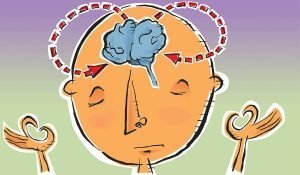“If you hear a voice inside you saying” you are not able to paint“, then without hesitation start painting, and that voice will be silenced.” ~ Vincent Van Gogh
It happens to everyone to be overwhelmed by doubts and uncertainties. Even the most successful and confident people feel sometimes terribly insecure.
Undeniably, however, some people have more confidence and security in themselves than others.
Some signs that could be clear indications of lack of confidence in yourself are:
– To think that others are better than you
– Always expect the worst
– To feel the need to justify your behavior in front of others
– To linger in negative thoughts – To react
exaggeratedly to criticism
– To avoid social situations
– To adopt a defensive body language and closing
If you recognize yourself in some of the behaviors indicated, you probably need to gain more confidence.
Personally, I believe that confidence, like courage, can in some way be cultivated and developed. Like a muscle, with training over time, confidence can also become stronger and more powerful.
Here are some ideas to regain complete confidence in yourself and make it one of your good habits:
1. Become a Friend of your Faults, your Limits, and your failures
This is a fundamental aspect. You are not perfect, obviously. No one is, indeed, we are all far from being so. And as long as you engage with your whole self to get out of your comfort zone and try to grow and improve, mistakes and failures will be inevitable. But mistakes are a fundamental part of the growth process, they are not something you should be ashamed of.
All self-confident people are at ease as they are, in place with themselves, with their own imperfections and faults. Aware that they have nothing to prove. And the same is true for you.
2. Do not put yourself on the defensive
Listening to other people’s criticisms and acting on their areas for improvement is an important part of the process of gaining self-confidence. When someone offers your point of view and constructive feedback about you or your behavior, accept it without hesitation, do not be afraid of being offended or humiliated.
It is often very difficult to be objective on ourselves, which is why the point of view of others can provide us with fundamental indications about our strengths and our weaknesses. So do not close, do not reject the opinions of others, welcome them as a precious treasure.
Obviously the perspectives, evaluations, and points of view of others can provide us with formidable cues and new interpretations on ourselves, but obviously, they do not always and necessarily represent the truth. If someone laughs at you or attacks you, this behavior says a lot more about him than it is about you. They are indeed the most insecure people who fall into this kind of behavior to try to hide their sense of inadequacy.
3. Do What You Believe It’s Right to Do
People who have greater self-confidence tend to rely on their intuition and their guiding values to stay on the right track, while those who are more insecure tend to be tossed about by the opinions and judgments of others.
Having an inner compass is an essential component of living with courage and confidence, and following one’s compass can sometimes mean having to take risks. But without risk, there is no growth.
4. Do not Be Arrogant or Aggressive
Self-confidence can manifest itself in very different ways and if it is sometimes expressed through well-defined attitudes, generally the most profound confidence is that which manifests itself in a calm, peaceful and contained way. Those who belive in themselves are simply those who are comfortable in their shoes.
Being sure and having self-confidence does not mean being aggressive, overbearing, arrogant or braggart: all this, on the contrary, is generally a vain attempt to mask a deep inferiority complex.
5. Establish Challenging Objectives
Self-confident people tend to live in a very conscious and deliberate way, constantly setting goals. They have sufficient self-confidence to tolerate error and failure and calmly accept that they do not achieve their goals on the first attempt. If we are not growing, then that means we are regressing – there is always a movement, forward or backward.
If we challenge ourselves, then we expand our comfort zone, and this growth often entails the pain of failure. This pain is too strong to bear for insecure people. But for those who trust themselves, failure is only a stepping stone, not the destination. Success, for those who are sure of themselves, is inevitable. It is only a matter of time.
6. Keep Trace of Your Successes
It is a rather frequent attitude among insecure people to compare oneself to others in negative terms. Those who have little self-confidence tend to believe that others are “better” and inevitably have everything that they lack to be happy.
In this regard, therefore, it can be very useful to keep track of the objectives and goals that are reached each time. If you compile a list of the results you’ve obtained, you may eventually realize that the list is longer than you actually could think. What would you think if those results had been achieved by someone else? Would you not be positively impressed? Do not underestimate yourself and do not diminish the goals you achieve.
7. Learn to Be Optimistic
People who lack self-confidence are often pessimistic about their own future and tend to generally think of the worst. It is instead extremely important for one’s personal growth to replace the negative and self-destructive mental chatter with firm and optimistic positive thinking.
Throughout the course of our days, thoughts swirl endlessly within our heads, and we need to be conscious and aware of this movement. Such self-awareness is not at all simple, but with a little perseverance, you can quickly become more aware of your thoughts, so that when you manage to “capture” a negative thought, you can consciously decide to replace it with something more positive.
8. Adopt a Balanced Approach
The benefits that come from self-confidence are quite evident, but, like many other things, excessive self-confidence can be counterproductive. In fact, an excess of self-confidence can easily lead to errors of judgment and evaluation. Security itself is the first and foremost balance.
9. Take it easy
Self-confident people are generally more relaxed, happier and more able to take pleasure from situations, however difficult and challenging these may be, compared to those with low self-esteem. People who trust in themselves, in fact, generally believe that they can manage and face without problems any problem or challenge that may arise.
Self-confident people know that if they are wrong, if something goes wrong, however, it will not be the end of the world. On the other hand, if you are constantly tense and worried about how others perceive you, your energy will be vainly wasted, because it will not be addressed to what really matters at that time. So let go, divert attention from yourself, relax and enjoy the ride.
The benefits of trusting yourself are pretty obvious: you’ll be happier, more relaxed, and probably healthier. You can use your time more effectively because you will not be constantly worried about the opinions of others. Confidence, in a sense, is the key to happiness and fulfillment.







